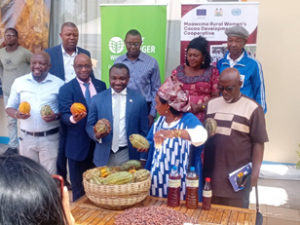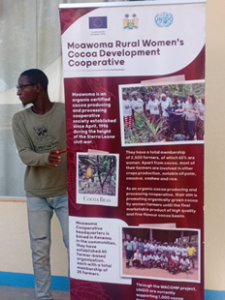By Lamin Bangura
On Monday, November 11, 2024, at Bintumani Hotel, Welthungerhilfe (WHH), in collaboration with the Ministry of Agriculture and Food Security (MAFS), hosted a landmark Cocoa Conference aimed at advancing Sierra Leone’s organic cocoa sector. This event drew representatives from key organizations, including Njala University, Moawoma, Sierra Leone Farmers’ Association, and the European Union, with discussions focused on enhancing cocoa production, market access, and sustainable development.

In his opening remarks, Prof. Allieu Bah, Deputy Vice Chancellor of Njala University, highlighted the significance of cocoa to Sierra Leone’s economy. “Cocoa is a major export crop that fuels our foreign exchange and provides sustainable livelihoods for many Sierra Leonean farmers. The organic nature of our cocoa, grown without fertilizers or agrochemicals, has attracted demand from European and international markets,” Prof. Bah explained. He added that Njala University is at the forefront of research and technical support in cocoa production, working closely with farmers to boost productivity. “Our students and faculty engage at all levels certificate to PhD, contributing to the adoption of improved cultivation techniques, which are increasing yields and earnings for farmers and the government,” he noted.

Prof. Bah also discussed “critical moments” in the cocoa production process, emphasizing the importance of selecting high-quality seeds, proper soil, and strategic timing for planting. He outlined the university’s role in guiding farmers on best practices, from soil selection to fermentation, to ensure high-quality beans for competitive export.
Dr. Henry Musa Kpaka, Minister of Agriculture and Food Security, echoed these sentiments, stressing the need for improved data and organization in the cocoa sector. “We need a better grip on our production data, tree ages, productivity, and the area under cultivation,” Dr. Kpaka noted. He pointed to Ghana’s organized cocoa board system, which has empowered farmers with increased prices and better resources, setting an example for Sierra Leone to enhance cocoa’s economic impact. “This sector can become one of our largest exports, but to do so, we need structured support and reliable statistics to drive targeted investments,” he said.
The Director of WHH underscored the organization’s commitment to the “Big Salone” agricultural transformation framework, emphasizing WHH’s partnership with local stakeholders, including Moawoma, the Sierra Leone Farmers’ Association, and the private sector. “This initiative seeks to empower women and youths in agribusiness, strengthen cooperatives, and foster sustainable cocoa production,” he said. “Our work with the EU and other partners is driving integration along the value chain, from cocoa bean fermentation to cocoa powder production. This approach not only improves productivity, but also positions our producers for global competitiveness.”
Representing Moawoma, the President of the Sierra Leone Farmers’ Association shared insights on Moawoma’s development as a model for local cocoa production. He highlighted the success of the EU-funded A4D project, which provided training in organic farming practices and facilitated the construction of a 500-metric-ton warehouse, with advanced quality management and handling capabilities. “Today, Moawoma represents 2,600 farmers who grow organic cocoa, contributing to the production of premium chocolate and cocoa liquor,” he stated. The project’s community-based fermentation centers ensure quality compliance, bolstering Sierra Leone’s reputation for high-standard organic cocoa.
The conference served as a platform for dialogue and pledged commitments to foster policy alignment, research, and funding support to secure Sierra Leone’s position in the global cocoa market. Dr. Kpaka concluded by emphasizing Sierra Leone’s potential to harness cocoa as an economic driver, echoing aspirations to emulate successful models from Ghana and beyond.
This gathering marks a pivotal step in Sierra Leone’s journey toward sustainable agricultural growth, with a vision for cocoa to play a transformative role in empowering communities and boosting national revenue.